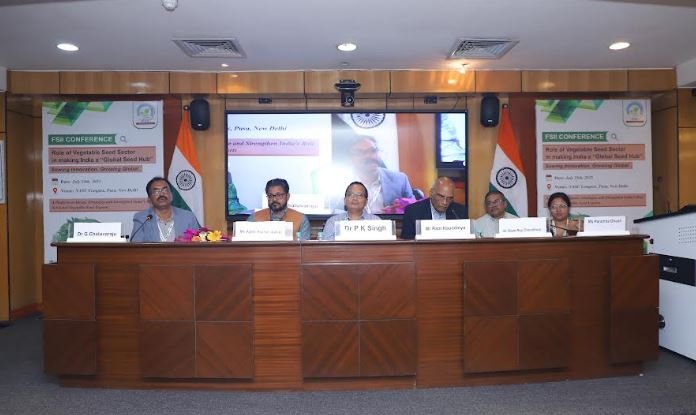Valued at $8.45 billion in 2024, the global vegetable seed market is expanding rapidly and experts believe India is well-positioned to become its next major hub, provided the right policies are introduced and effectively implemented. With the government placing renewed focus on the horticulture sector through its comprehensive programme for vegetables and fruits, experts in a national conference asserted that strengthening IPR and introduction of biotech along with enabling policy support could drive the Indian vegetable seed market from $740 million in 2023-24 to $970 million by 2030, growing at a CAGR of 4.6%.
 |
Experts shared insights and perspectives at the National Workshop on ‘Role of Vegetable Seed Sector in Making India a “Global Seed Hub”
“India’s rise in horticulture specially vegetable production is linked to the rich germplasm, diverse growing conditions, R&D innovations and strategic investments by the private and public institutions,” said Dr P K Singh, Agriculture Commissioner, Ministry of Agriculture & Farmers Welfare, Government of India. “Horticulture has moved from the margins to the mainstream, driven by Seed sector R&D, hybrid seed adoption, and a shift towards a science-led seed industry. Yet, our global potential remains largely untapped.”
At a national conference titled ‘Role of Vegetable Seed Sector in Making India a Global Seed Hub’ organised by Federation of Seed Industry of India (FSII) in Capital on Friday senior government officials, agricultural scientists, seed industry leaders, and policymakers deliberated on regulatory hurdles and ways of unlocking the country’s export potential.
“India’s seed sector is at a defining moment. With rich agro-climatic diversity, competitive production systems, a dynamic private sector, and strong public research institutions, we have all the building blocks to become a global seed production hub,” said Mr. Ajeet Kumar Sahu, IAS, Joint Secretary (Seeds), Ministry of Agriculture & Farmers Welfare.
“The Ministry is streamlining licensing, introducing science-based regulatory reforms, enabling digital traceability through the SATHI platform, and investing in modern seed infrastructure including processing plants, storage, and testing labs. These steps will ensure farmers get timely access to certified, high-quality seeds with full QR-code-based traceability, helping reduce crop losses, improve productivity, and protect them from spurious inputs,” he added.
While government officials highlighted the enabling policy ecosystem being built to catalyze India’s global competitiveness, agricultural scientists emphasized the transformative role of hybridization, biotechnology, and public-private collaboration in enhancing productivity.
India currently exports about $120 million worth of vegetable seeds annually, mainly to Southeast Asia and the Middle East. Experts believe this could easily double or triple if long-standing policy hurdles are addressed, chief among them a backlog of over 100 Pest Risk Analyses (PRAs) pending since 2016, stalling trade worth an estimated $55 million.
“We call for a unified regulatory approach and the introduction of “One Nation, One Licence” model for domestic seed registration and a single-window export clearance system. These, along with digitized approvals and longer duration license validity, are critical to improving India’s ease of doing business in seeds,” said Mr Rajvir Rathi, Vice Chairman, FSII, Director, Agricultural Affairs & Policy – IBSL & Lead, Traits Licensing, Bayer CropScience Ltd.
India’s comparative advantages, diverse agro-climatic zones, low production costs, a vibrant R&D ecosystem, and skilled workforce, position it uniquely to lead the global seed trade. Already, over 300 companies operate in the country’s formal seed market, contributing 80-85% of the value and investing more than $200 million annually in research.
Beyond productivity, the vegetable seed sector has profound socio-economic ripple effects. It supports over 100,000 direct jobs, empowers women smallholders, and offers year-round income stability in rural areas. Nutritionally enhanced vegetables are also addressing hidden hunger by providing essential micronutrients at scale.
As global food systems brace for climate and population shocks, the conference concluded with a strong consensus; India must reform fast, innovate continuously, and position itself as the world’s most reliable and responsible supplier of high-quality vegetable seeds. The seeds of global leadership, it appears, have already been sown.
![]()

